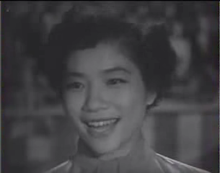Loading AI tools
Musical artist From Wikipedia, the free encyclopedia
Chiemi Eri (江利 チエミ, Eri Chiemi, January 11, 1937 – February 13, 1982),[1] was a Japanese singer and actress.
Eri Chiemi 江利 チエミ | |
|---|---|
 Chiemi Eri in 1952 film Mōjū tsukai no shōjo | |
| Background information | |
| Birth name | Kubo Chiemi |
| Born | January 11, 1937 Taitō, Tokyo, Japan |
| Died | February 13, 1982 (aged 45) |
| Genres | Jazz, pop, kayōkyoku, enka |
| Occupation | Singer |
| Years active | 1952–1982 |
| Labels | King Records |
Eri was born as Chiemi Kubo (久保 智恵美, Kubo Chiemi) on January 11, 1937 in Tokyo, Japan. She was born to a musician father and a mother who was a singer, thus encouraging her musical career.[2] She started her singing career at the age of 14 with her version of "Tennessee Waltz." She regularly sang on American military bases as a teenager.[3] Her repertoire consisted largely of traditional Japanese songs as well as a few American songs such as "Jambalaya" and "Come on-a My House". Eri started her career as an actress similar to Hibari Misora. Eri, Misora and Izumi Yukimura formed a trio. In her concerts, she was supported by Nobuo Hara's jazz band.[4] The actress was one of Japan's best-known singers in the mid-20th century and also appeared in numerous television shows from the early 1950s until just before her death. However, she is fairly unknown in many other parts of the world since her albums were rarely distributed in other markets, in which her music can almost only be accessed via the internet.
Eri married Ken Takakura in 1959 and they divorced in 1971.[5] She released the single "Sakaba Nite" (酒場にて, lit. "At the Bar") in 1974. The song was later included in the omnibus album "Enka no Kokoro".[6]
On the afternoon of February 13, 1982, Eri was found prone and not breathing on the bed of her Minato Ward apartment in Tokyo, by her manager. Her cause of death was listed as a stroke with asphyxiation due to vomit in the trachea. A further report indicated that while she had a cold and had already been drinking, a combination of whiskey mixed with milk, as well as cold medicine that she had heated up may have had a role in her death.
Eri began her career as a singer at the age of 14 and would continue to record throughout her career. Many of her albums focused on Japanese folk music though she would often blend American standards with Latin grooves[7] at the behest of Nobuo Hara, a prolific jazz musician and leader of Eri's backing band.
She acted in 51 films:[8]
This section may require cleanup to meet Wikipedia's quality standards. The specific problem is: romanize Japanese or use English title. (January 2013) |
(1950s complete)
This section is empty. You can help by adding to it. (January 2024) |
(1970s -1980s complete)
Seamless Wikipedia browsing. On steroids.
Every time you click a link to Wikipedia, Wiktionary or Wikiquote in your browser's search results, it will show the modern Wikiwand interface.
Wikiwand extension is a five stars, simple, with minimum permission required to keep your browsing private, safe and transparent.